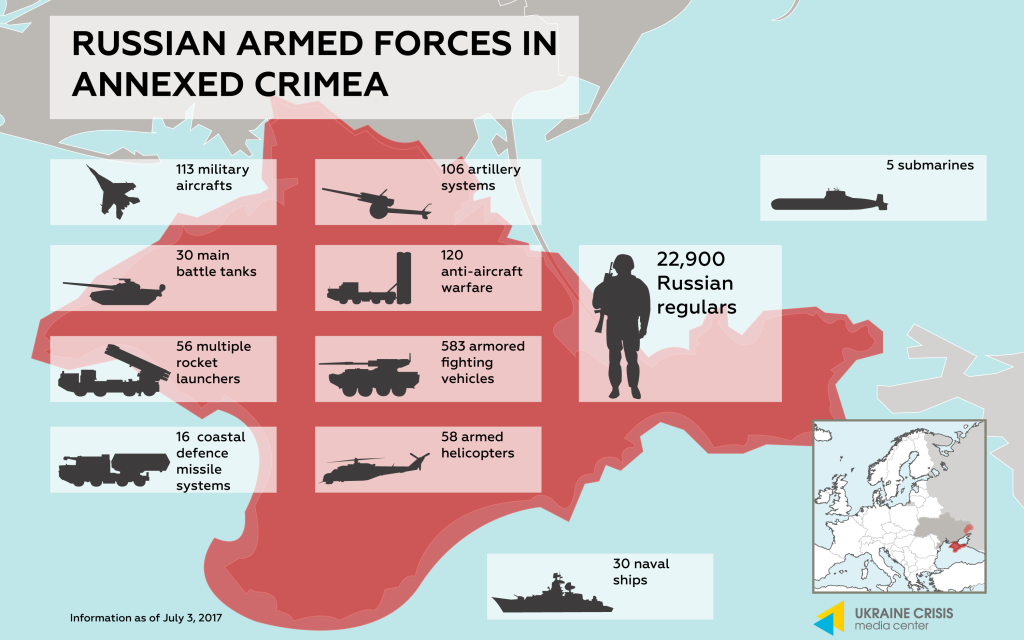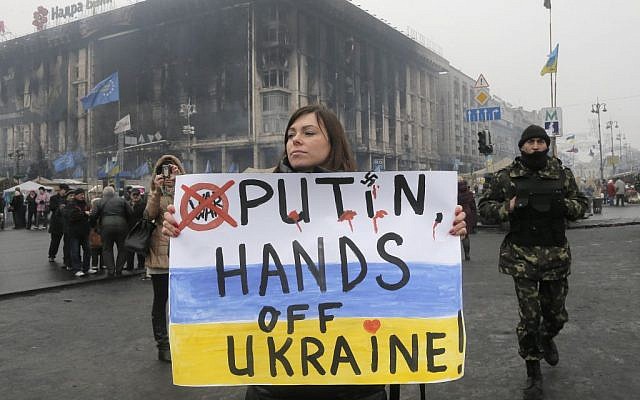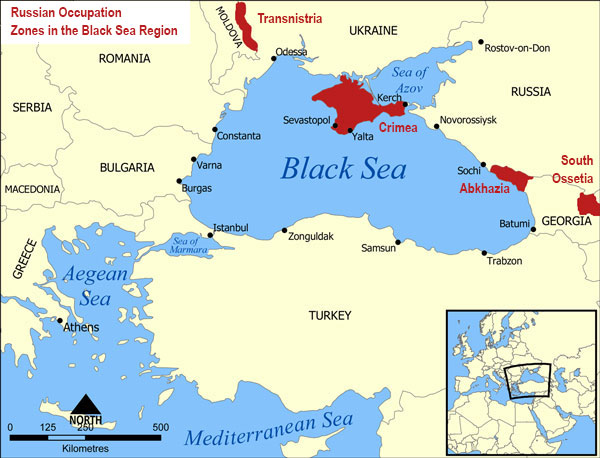 In 2014, Russia annexed Crimea (a peninsular region in Ukraine) and currently about 7% of Ukraine's territory is under Russian control. This issue has been one of the most important military interventions of modern times. But why did this happen and what are the consequences of it? In this article, we are going to tell you Everything You need To Know About It and also is impact on India.
In 2014, Russia annexed Crimea (a peninsular region in Ukraine) and currently about 7% of Ukraine's territory is under Russian control. This issue has been one of the most important military interventions of modern times. But why did this happen and what are the consequences of it? In this article, we are going to tell you Everything You need To Know About It and also is impact on India.Quick Facts
- Ukraine gained independence from the Soviet Union in 1991.
- Since then Ukraine can be divided into 2 regions - Eastern Ukraine(mostly pro-Russian people) and Western Ukraine(people who want to join EU and NATO).
- Ukraine also applied to the NATO Membership Action Plan in 2008.
- In 2010, Viktor Yanukovych was elected as the President. He was a pro-Russian so he preferred to keep Ukraine away from NATO in order to improve relations with Russia.
- In 2013, Viktor Yanukovych rejected a deal with EU to further improve his relations with Russia.
- This outraged the people of Ukraine and in 2014, the pro-EU fraction overthrew the the Viktor led government in Kiev(the capital of Ukraine) and got control of many government buildings. This is called the Ukrainian Revolution or the Maidan Revolution.
- This was followed by the annexation of Crimea by Russia.
- This led to frequent attacks occurring from both sides across the provinces of Donetsk and Luhansk.
- Separatist forces began fighting the Ukrainian army and the separatists soon started getting help from Russian Army Units who backed them up with armory and artillery.
What did Russia do to Crimea?
On 27 February, some unmarked armed men and pro-Russia militants seized the Crimean parliamentary building. Ukraine lost control of its government buildings, airports and military bases in Crimea. The same day the Crimean parliament replaced the local government with one who wanted Crimea to unify with Russia. This government then organized the 2014 Crimean status referendum on 14 March 2014 in which the voters voted to join Russia.On 17 March 2014, Crimea declared its independence. Next day, a treaty on incorporating Crimea and Sevastopol into Russia was signed in Moscow and in five days the "Constitutional Law on admitting to the Russian Federation the Republic of Crimea and establishing within the Russian Federation the New Constituent Entities the Republic of Crimea and the City of Federal Importance Sevastopol" was quickly pushed through the Russian parliament, signed by the Russian President and entered into force.
On 19 March 2014, all Armed Forces of Ukraine were withdrawn from Crimea.
On 17 April 2014, President Putin stated that the Russian military had backed Crimean separatist militias, stating that Russia's intervention was necessary "to ensure proper conditions for the people of Crimea to be able to freely express their will".
In December 2015, Putin admitted that Russian military intelligence officers were operating in Ukraine, insisting though that they were not the same as regular troops.
Also read about the East Ukrainian problem!
 |
| Photo from Ukraine Crisis Media Centre |
Does Crimea belong to Russia or Ukraine?
The political status of Crimea has been a subject of a territorial dispute between Ukraine and Russia. Russia annexed Crimea in 2014 following a referendum, and administers it as two federal subjects of Russia, and claimed it to be 'fully integrated' in July 2015. Ukraine and the majority of international governments continue to regard Crimea as an integral part of Ukraine.
 |
| A woman holds a poster against war at Kiev's Independence Square, in Ukraine, Thursday, March 6, 2014. (photo credit: AP/Efrem Lukatsky) |
Did Crimea vote to be with Russia?
As stated above, a referendum was held in 2014 in which more than 80% of the people of Crimea voted to join Russia. But the referendum was regarded as illegitimate by most members of the European Union, the United States and Canada mainly due to Russian intervention. Thirteen members of the United Nations Security Council voted in favor of a resolution declaring the referendum invalid, but Russia vetoed it and China abstained. 

Was Crimea historically a part of Russia?
Crimea was annexed by the Russian Empire during the reign of Catherine The Great in 1783 and remained part of Russia until 1954, when it was transferred to Ukraine under the then Soviet leader Nikita Khrushchev.Why does Russia want Crimea?
Russian President Vladimir Putin says that the area mostly comprises of ethnic Russians and the Ukrainian “fascists” threaten the life and property of the Russian-speaking people in Crimea and he believes that it is his solemn duty to protect them.But in reality, the strategically located peninsula gives Russia military leverage not only in the Black Sea, but also in the greater Mediterranean region. After the fall of the Soviet Union, a 1997 treaty with Ukraine allowed Russia to keep its Black Sea Fleet in Sevastopol, under a lease that has been extended until 2042. Sevastopol is the largest city on the Crimean Peninsula and a major Black Sea port.
So basically, Russia is interested in Crimea only to build a solid military stronghold in Europe.

What is the solution? Should international community get involved?
Most of the International community is in favour of Ukraine. This was proved when on 24 March 2014, the G7 members[Read more about G7 here] cancelled the planned G8 summit that was to be held in June that year in the Russian city of Sochi, and suspended Russia's membership of the group, due to Russia's annexation of Crimea. Also, Russia now faces deeper isolation, tougher sanctions and greater economic hardship than at any time since the Cold War. On 4 March 2014, the United States pledged $1 billion in aid to Ukraine.As far as NATO getting involved is concerned, Ukrainians are slowly moving in favour of NATO. According to polls conducted between 2005 and 2013, Ukrainian public support of NATO membership remained low. However, since Russia's invasion of eastern Ukraine and Crimea, public support for Ukrainian membership in NATO has risen greatly. In 2016, around 71% Ukrainians were in support of NATO as compared to 20% in 2013. NATO has been conducting many military exercises in Poland and Baltic region which are very close to Crimea. The measures are apparently limited so as not to appear aggressive.
Former President of USA, Barack Obama said this about the situation,
We respect that Russia has legitimate security interests in the Crimea, as well as its ethnic and cultural ties to the majority of the Crimean people whose interests are not aligned with the Ukrainians in the west. At the same time, Ukraine has legitimate interests in protecting its sovereignty and we, the US, want to ensure that international law is respected and borders are not unilaterally rearranged by stronger countries. Therefore we propose that Russia offers to “buy” the Crimea for $100 billion to be paid over 10 years. We will persuade the leadership of the Ukraine to accept this proposal and voluntarily cede the Crimea to Russia.To be honest, this sounds like a solid solution of the problem. But will Russia consider this? Or most importantly, will Ukraine accept such an offer? Only time will tell!
As Indians, should we even bother? How does this impact us?
Any issue between 2 countries has direct or indirect impact on other countries as well. India is no different. Russia is the world’s largest energy and minerals producer. It cannot afford to not sell oil, natural gas, and extractive minerals to its customers because then its economy will crash. Russian exports to India amounted to $6.2 billion or 1.3% of its overall exports, and 0.9% of India's overall imports in 2014. Russian imports from India amounted to $3.1 billion or 1% of its overall imports, and 0.7% of India's overall exports in 2014. Russia sells us weapons, gems, precious metals, fertilisers and mot importantly oil and buys pharmaceuticals, vehicles, electronic equipment, tea, coffee, spices, tobacco and other food items from India. India has clearly stated that Russia plays an important role in international issues relating to Afghanistan, Syria and Iran. India was with Brazil, China and South Africa in opposing any restrictions on the participation of Russian President Vladimir Putin at the G-20 Summit in Australia in the wake of the Crimean issue. Russia has been a very important ally to India since 1971. This alliance played a major role in us winning the 1971 War with Pakistan.As far as relations with Ukraine are concerned, Ukraine is not a major export destination for India so India can safely maintain its ties with Russia.

Comments
Post a Comment